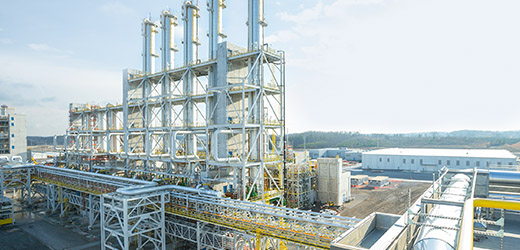Plant and Transport Safety
Incident management and Prevention
An important goal at WACKER is to operate plants and processes in a manner that poses no risk to people or the environment. Our Group safety management system addresses occupational and plant safety and crisis management.
The main focus is on prevention. Nevertheless, safety-critical incidents cannot always be prevented. Each WACKER site has an emergency response plan in place for coordinating internal and external emergency response teams and working with the authorities.
The first step in ensuring the safety of our plants is to systematically identify and assess risks. Here we analyze the energy used in processes (e.g. pressure and heat), as well as the effects that individual errors might have on a chain of events that could culminate in the release of a substance or lead to an accident. Using the results of our analyses, we specify safety measures to prevent the occurrence of undesirable incidents.
Across the Group, we promptly record any incident relevant to safety, health or the environment in the IT system we use for sustainability reporting (SPIRIT), evaluate these reports and track the measures taken. We use incident reports that provide learning experience for the Group’s other divisions or sites to inform corporate units with similar hazard potential and, if possible, identify measures for improvement.
In addition to continuous evaluation of pipe bridges, a groupwide prevention program focuses on hazards caused by stress corrosion cracking that is difficult to detect. WACKER attaches particular importance to providing its safety experts with ongoing training. We enhance our experts’ knowledge of explosion-damage protection by holding interactive online training courses. We conduct regular training sessions on plant safety and explosion-damage protection, for example. We give special recognition to facilities that operate for sustained periods of time without a reportable accident.
Employees in Germany can use our idea management system to quickly and easily report safety-critical situations. As a result, hazards can be identified and eliminated at an early stage before they lead to an accident.
Once a year, the plant fire departments in Burghausen and Nünchritz conduct emergency drills in tandem with local fire and emergency services. These drills provide a practical opportunity for rehearsing a major emergency response. Afterward, the exercise is analyzed to identify and eliminate any weak points. Training drills are likewise regularly carried out at our major non-German sites, e.g. in China and in the USA.
WACKER’s plant fire department in Burghausen also trains fire departments from the local area. It invites the fire departments of other companies and municipalities to WACKER sites, where they can prepare their response to accidents involving dangerous goods. As and when needed, our plant fire department at the Nünchritz site also supports local firefighters responding to major emergencies.
The German chemical industry established its Transport Accident Information and Emergency Response System (TUIS) to provide assistance in the event of chemical accidents. Our experts support this network, which is part of the chemical industry’s Responsible Care® initiative.
|
|
|
|
|
|
|
|||||
|
|
2022 |
|
2021 |
|
2020 |
|||||
|---|---|---|---|---|---|---|---|---|---|---|---|
|
|
|
|
|
|
|
|||||
Number of environment- and safety-related incidents1, Group |
|
35 |
|
39 |
|
29 |
|||||
Environment- and safety-related incidents per 1 million hours worked2, Group |
|
1.5 |
|
1.7 |
|
1.3 |
|||||
|
|||||||||||
Safe Transport of Hazardous Materials
WACKER ensures that its products are transported safely, especially where hazardous materials are involved. All sites at which WACKER produces and ships goods must comply with locally and internationally applicable transport regulations, as well as with WACKER’s own strict safety standards. We ensure their consistent application by means of a groupwide directive on transport safety for chemicals and hazardous goods. An essential element of transport safety is our personnel, who are highly trained both in handling hazardous goods and securing loads.
We have similarly high expectations of our logistics providers – above and beyond statutory regulations, we impose additional requirements in our contracts and comprehensive requirements profiles. If our contractors should deviate from our requirements, we issue formal complaints and demand corrective action to ensure a continuous improvement process.
For products with a high hazard potential, we use packaging and tanks that meet the most demanding quality standards. Some 163,000 tons of hazardous materials were shipped from our German sites in the reporting year. We recorded not a single reportable transport incident involving hazardous goods.
When monitoring the distribution of our products, we also record any transport incidents that do not involve hazardous goods, as well as those that have no negative impact on people or the environment. Such incidents are an important factor in the annual assessment of our logistics providers.
|
|
|
|
|
|
|
Number of reportable accidents |
|
2022 |
|
2021 |
|
2020 |
|---|---|---|---|---|---|---|
|
|
|
|
|
|
|
Road |
|
– |
|
1 |
|
– |
Rail |
|
– |
|
– |
|
2 |
Sea |
|
– |
|
– |
|
2 |
Inland waterways |
|
– |
|
– |
|
– |
Air |
|
– |
|
– |
|
– |

